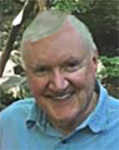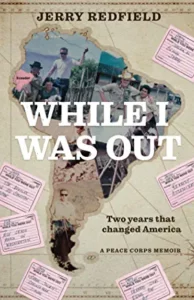Review — WHILE I WAS OUT by Jerry Redfield (Ecuador)
While I Was Out: Two Years That Changed America — A Peace Corps Memoir
by Jerry Redfield (Ecuador 1963-65)
Peace Corps Writers Imprint
292 pages
July 2022
$22.00 (paperback)
Reviewed by Cynthia Nelson Mosca (Ethiopia 1967-69)
•

Jerry Redfield
Shortly before “Hell no, we won’t go!” there was the Peace Corps. While I Was Out by Jerry Redfield, takes place during the years 1963 to 1965. Early years for the Peace Corps, turbulent years for our country. This book is a real story taken from the author’s journals and letters home. Our hero, Jerry, vacillates between confusion, frustration, and impatience. Will he be able to put aside his attitude in time? Will he fall in love? Will he develop long term friendships? And ultimately will he fall in love with the people of Ecuador?
In the ’60s we were nothing if not assured. Half of the youth of our country was absolutely certain that the conflict in Vietnam was wrong. The other half were absolutely positive that the government wouldn’t deceive us. It was a time of cynicism and naïve belief. We were sure we knew how things should be done. And in the middle of this assuredness here comes the Peace Corps, idealistically believing young Americans could make a difference.
Jerry survives four months of training and finds himself in the middle of nowhere in the mountains of Ecuador — “We could die here and no one would ever know.”
But he does not die, though there were some mornings after drinking trago that he may have wished for a quiet demise or at least a large bottle of aspirin. Trago is a homemade sugar-cane based alcoholic shot. He was insistently offered this in most social situations and not knowing how to gracefully refuse (not covered in Peace Corps training) he accepted. This was usually regretted the next day, but what’s a dinner, a holiday, a parade without trago?
The format of While I Was Out, has an intriguing and informative design. What was happening in the USA while Jerry was busy building schools, coaching basketball, and teaching English? The author faithfully inserts bits and pieces in three-month chunks that cover politics, international affairs, civil rights, and culture, including the Beatles appearance in the U.S. in 1964.
In the preface, the author writes that he was “dating a girl who had pretty strong designs on me and my future, but I wasn’t eager to commit at that point.” However, she also joined the Peace Corps and ends up in South America. Before you know it, “Ann had a ring on her finger. She was thrilled, and I’m sure her mother was much relieved as well.” Ann was thrilled, but how was Jerry feeling? He neglected to quote Rhett Butler so let me include it here, “Frankly my dear, I don’t give a damn.” Guess how this ends?
The author is unflinchingly honest about himself and the Peace Corps, and it is not always a sweet story. In this memoir we are introduced to a variety of characters, some who had a positive impact on the life of the volunteer and some who hindered his efforts to support the health or well-being of the community. As Anne Lamott wrote, “You own everything that happened to you. Tell your stories. If people wanted you to write warmly about them, they should have behaved better.”
On that note, we are ready for the paymaster, Mario Mena, who was in charge of paying the workers, but was without any sense of urgency about actually doing his job. He said he was willing to accommodate, but seldom did.
Before his death, Jerry’s lifelong friend Ruben Patiño helped him to remember events and details of his time in Ecuador. The Peace Corps placed Jerry in a location, but the work assignment was quite unstructured. He had to find the problems, and then initiate solutions. Doing this required knowledge of the local power structure. It was a time-consuming process requiring more patience than most young Americans have, and yet the author managed to do it. In less than two years, Jerry and the community managed to build a school, and he started and taught adult English classes, coached a girls basketball team, and helped plan and layout a park. He was determined to make a difference to the community he served. What he didn’t anticipate was how it changed his perceptions and his life ever after. And yes, he did fall in love with the people of Ecuador!
•
 Cynthia Mosca (Ethiopia 1967-69) spent over forty years in the field of education. She has taught all ages and ended her career as the Director of Language Minority Services in Cicero, Illinois. She has also served as adjunct faculty for several Chicago area colleges, where she taught graduate courses in bilingual education.
Cynthia Mosca (Ethiopia 1967-69) spent over forty years in the field of education. She has taught all ages and ended her career as the Director of Language Minority Services in Cicero, Illinois. She has also served as adjunct faculty for several Chicago area colleges, where she taught graduate courses in bilingual education.
Cynthia is currently part of a Peace Corps Virtual Service Project in Ethiopia, and a member of the EERPCV board. She recently published through Peace Corps Writers Imprint, Letters from a Wondrous Empire, An Epistolary Memoir.

Thanks for the review. I’ll order the book. Sounds like the kind of Peace Corps book I like.